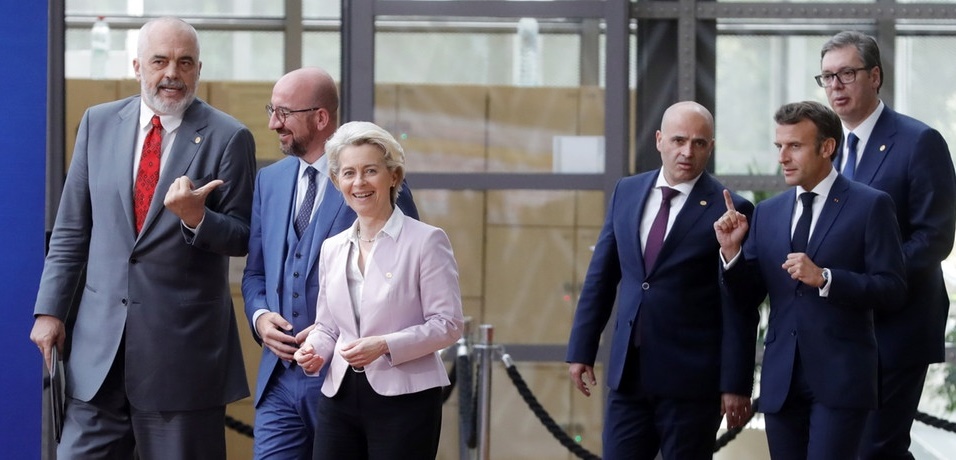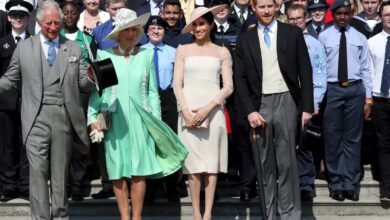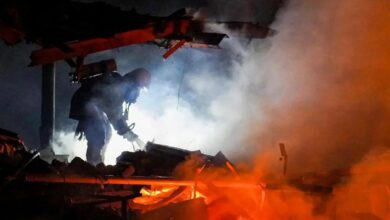
The EU’s summit meeting with the Western Balkans ended without any progress. The accession talks with North Macedonia and Albania are thus still blocked despite Chancellor Scholz’s advocacy. / Western Balkans meeting
The EU countries have ended their consultations with the six Western Balkans countries willing to join without any concrete results. There were “open discussions,” according to EU circles after the almost four-hour consultation in Brussels. However, no progress has been made on the way to opening accession negotiations with Albania and North Macedonia and agreeing on visa liberalization for Kosovo, it said.
The press conference originally scheduled after the consultations with EU Council President Charles Michel, French President Emmanuel Macron and EU Commission President Ursula von der Leyen was canceled due to time constraints.
Even before the meeting, Albanian Prime Minister Edi Rama had expressed his frustration at the standstill. “It’s a shame that a NATO country is holding two other NATO countries hostage,” he said of the Bulgarian blockade. The other 26 EU countries put on a “terrifying show of impotence”.
Scholz’ advertising and Macron’s compromise without success / Western Balkans meeting
Federal Chancellor Olaf Scholz had insisted in vain on clearing the way for accession talks. The government in Sofia demands that North Macedonia should recognize the Bulgarian roots in its language and history as well as the rights of the Bulgarian minority before the start of EU accession negotiations.
Even a French compromise proposal brought no rapprochement. The situation was complicated by the fact that Bulgarian Prime Minister Kiril Petkov fell on Wednesday over a vote of no confidence.
With reference to the geostrategic importance of the Western Balkans and the influence of Russia and China, Chancellor Scholz had insisted on a rapid rapprochement of the six Balkan states with the EU. “Germany will support the activities of the western Balkan states on their way to the EU,” he said in Brussels. The countries must finally get the feeling that their reform efforts are being rewarded.
Differences between Western Balkan countries are becoming clear
Differences between the six Western Balkan states of Serbia, Kosovo, Montenegro, Albania, North Macedonia and Bosnia-Herzegovina, which are all at different stages in their EU rapprochement, also became apparent in Brussels. The President of Kosovo, Vjosa Osmani-Sadriu, criticized Serbia, which still does not want to recognize the former province as independent.
Only those countries that also support the EU sanctions against Russia should move forward in the EU accession negotiations, she said. This is not the case with Serbia, for example. Osmani-Sadriu emphasized that her country’s only option is to join the EU. It is impossible to want to orientate yourself towards both the EU and Moscow, she added, also referring to Serbia.
Serbia does not support EU sanctions
Serbia has not joined EU sanctions against Moscow for attacking Ukraine. Chancellor Scholz had repeatedly warned the government in Belgrade that EU accession candidates were expected to share EU foreign policy. Serbian President Aleksander Vucic pointed out in Brussels that his government is very much in favor of Ukraine’s territorial integrity. But some EU states don’t even respect Serbia’s, he said, referring to Kosovo.
The regular two-day EU summit of the 27 EU heads of state and government begins in Brussels in the afternoon. According to EU Council President Charles Michel, EU candidate status should be decided for Ukraine and Moldova. Georgia, on the other hand, is only to be given a “European perspective” without official candidate status.
European Central Bank: Key interest rate to rise by 0.25 points



